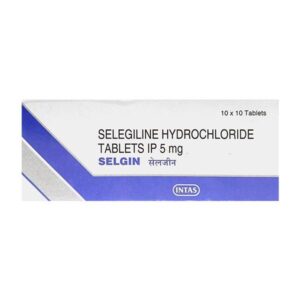SELEGILINE
SELEGILINE: Selegiline, also known as L-deprenyl, is a medication primarily used in the treatment of Parkinson’s disease. It is classified as a monoamine oxidase inhibitor (MAOI) and is available in both oral and transdermal (patch) forms.
The main mechanism of action of selegiline is the selective inhibition of monoamine oxidase type B (MAO-B) enzyme, which is responsible for breaking down dopamine in the brain. By inhibiting this enzyme, selegiline increases dopamine levels, thereby improving motor symptoms and reducing the progression of Parkinson’s disease.
Selegiline is typically prescribed as an adjunct therapy to levodopa, the main drug used in Parkinson’s treatment. It helps to extend the duration of levodopa’s therapeutic effects by preventing its breakdown and reducing fluctuations in dopamine levels.
The recommended daily dose of oral selegiline is usually 5-10 mg, divided into two or three doses. However, the transdermal patch provides continuous drug delivery without the need for multiple daily doses and is typically started at a dose of 6 mg per 24 hours.
As with any medication, selegiline may cause side effects. Common side effects include nausea, headache, dizziness, insomnia, and dry mouth. These effects are usually mild and go away with continued use or dose adjustment. In some cases, selegiline may also increase blood pressure or cause interactions with certain medications and foods containing tyramine.
It is crucial to follow the prescribed dosage and inform the healthcare provider of any other medications being taken, including over-the-counter drugs and herbal supplements, to minimize the risk of drug interactions. Selegiline should not be taken concomitantly with other MAOIs or within two weeks of stopping a MAOI to avoid the risk of serotonin syndrome.

